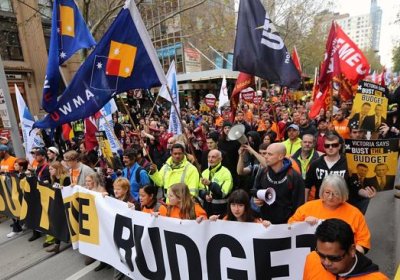LIFE FOR MOST AUSTRALIANS IS GETTING HARDER, WHILE POLITICIANS SERVE THE WEALTHY. BUT PUBLIC BACKLASH IS BREWING INTO A MOVEMENT TO CHALLENGE THIS SYSTEM, WRITES SUSAN PRICE.
In handing down its first budget, the Coalition government echoed its National Commission of Audit, warning that a “business as usual” scenario for public spending on welfare, pensions, public services, health and education is “unsustainable”, even “irresponsible” in Australia today.
Block the budget
Union activists have written an open letter to Victoria Trades Hall Council calling for a state-wide delegates meeting to organise a strike to bust the budget.
A similar petition has been launched in NSW, calling on Unions NSW to organise a mass delegates meeting to plan for a stop work protest against the budget. Sign the letter at change.org.
Read the letter to the Victorian Trades Hall Council below.
***
Prime minister Tony Abbott chalked up his first budget win on June 17 when the 2% “levy” on high income earners passed both houses of parliament. The next day, the Greens trumpeted the emergence of a double dissolution “trigger” when the Senate rejected the bill to abolish the Clean Energy Finance Corporation.
It is no coincidence that Abbott wanted the temporary tax on high-income earners to be the first budget measure passed. He wants people to believe his lie that “the burden” of this budget is “shared” by all sections of the community.
Much of the public debate on the Senate “blocking supply” suggests that it is an all or nothing tactic. However this is not the case. The Senate can carefully cherry-pick the elements in the budget that it demands be amended and force the Abbott government to either accept those amendments or see its budget fail.
This is a short explanation of the Senate’s powers and its ability to force a budget debate on its terms with the government-dominated House of Representatives.
THE BILLS
The Federal budget contains two main pieces of legislation:
Repealing the carbon tax, abolishing the department of climate change, and getting rid of the Clean Energy Fund were the top three wishes in “75 radical ideas to transform Australia”, released by the Institute of Public Affairs (IPA) in 2012. Number six was to repeal the Renewable Energy Target (RET).
In the recent federal budget, the Coalition government is aiming to do all four.
Tens of thousands marched against Abbott government in six cities around Australia on May 18. The march in Sydney was bigger than the March In March demonstration. Peter Boyle, who took the photos below, estimates it was about 15,000-strong. He said: "It stretched more than two and half times the distance between Central Station and Victoria Park (where it ended). The recent horror budget angered many and the crowd overwhelmingly demanded that the opposition parties block the budget in the Senate -- where they have the numbers until July."




